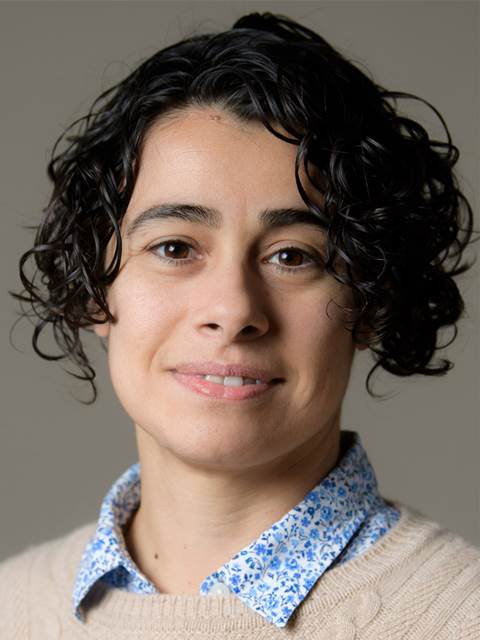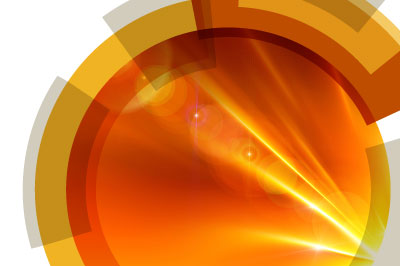 Anat Milo, Ben-Gurion University of the Negev, Israel
Anat Milo, Ben-Gurion University of the Negev, Israel
Anat Milo received her BSc/BA in Chemistry and Humanities from the Hebrew University of Jerusalem in 2001, her MSc from UPMC Paris in 2004 with Berhold Hasenknopf, and her PhD from the Weizmann Institute of Science in 2011 with Ronny Neumann. Her postdoctoral studies at the University of Utah with Matthew Sigman focused on developing physical organic descriptors and data analysis approaches for chemical reactions. At the end of 2015 she returned to Israel to join the Department of Chemistry at Ben-Gurion University of the Negev, where her research group develops experimental, statistical, and computational strategies for identifying molecular design principles in catalysis with a particular focus on stabilizing and intercepting reactive intermediates by second sphere interactions.
 Anne McNeil, University of Michigan, United States
Anne McNeil, University of Michigan, United States
Anne McNeil is the Carol A. Fierke Collegiate Professor of Chemistry and Macromolecular Science and Engineering, an Arthur F. Thurnau Professor and an HHMI Professor at the University of Michigan. Her current research interests include chemical recycling of waste plastic, methods for capturing microplastics, and identifying new materials for redox flow batteries. Prior to Michigan, she received her BS in Chemistry from the College of William and Mary (1999), her PhD from Cornell University (2005), and was a L’Oreal Post-doc Fellow at MIT (2005–2007).
 Bin Tan, Southern University of Science and Technology, China
Bin Tan, Southern University of Science and Technology, China
Bin Tan earned his Ph.D. in 2010 at Nanyang Technological University for his doctoral studies with Professor Guofu Zhong. He then pursued postdoctoral studies at The Scripps Research Institute with Professor Carlos F. Barbas until end of 2012, at which point he began his independent academic career as Associate Professor at the Southern University of Science and Technology (SUSTech). After earning Tenure and being promoted to Full Professor in 2018, he has recently been named chair professor at the department of Chemistry in SUSTech. His research centers around asymmetric chemistry of axial chirality and core-structure directed organocatalytic asymmetric synthesis. Professor Tan has received various national and international recognitions for his research, including the Asian Rising Stars Lectureship Award and the Distinguished Lectureship Award from the Chemical Society of Japan. He was also the recipient of The National Science Fund for Distinguished Young Scholars and won the first prize of Guangdong Natural Science Award.
 Daniele Leonori , RWTH Aachen University, Germany
Daniele Leonori , RWTH Aachen University, Germany
Daniele Leonori obtained his PhD at the University of Sheffield under the supervision of Professor Iain Coldham (2010). After postdoctoral studies with Professors Magnus Rueping (RWTH Aachen University) and Peter H. Seeberger (Max Planck Institute) he joined the group of Professor Varinder K. Aggarwal FRS as Research Officer (University of Bristol). In 2014 he commenced his independent career as Lecturer in Organic Chemistry at the University of Manchester and was promoted to Reader in 2018 and Professor in 2020. In 2022 Daniele moved to RWTH Aachen University where he is W3 Professor of Organic Chemistry. The research in his group is focused on discovery, design and development of novel catalytic methods for chemical synthesis of biologically active molecules.
 David MacMillan, Princeton University, United States
David MacMillan, Princeton University, United States
David MacMillan is a chemist whose studies focus on organic catalysis and synthesis. David is best known for his pioneering work in the field of asymmetric organocatalysis, where the rate of a chemical reaction is increased by the presence of a chiral organic catalyst. His findings have opened up many new avenues for chemical synthesis and reaction design.
His research highlights include the discovery of a number of novel catalytic agents, including iminium ion catalysts and SOMO (singly occupied molecular orbital) and photoredox organocatalysts. He has also designed over fifty new chemical reaction processes. Alongside his research, David served as the Editor-in-Chief for Chemical Science from 2010 to 2014.
David has received a number of awards in recognition of his work, including sharing the Nobel Prize in Chemistry in 2021 with Benjamin List for the development of asymmetric organocatalysis. He has also received the Corday–Morgan Prize of the Royal Society of Chemistry in 2005 and the Ernst Schering Prize in 2015. In addition to being elected a Fellow of the Royal Society, he became a Member of the American Academy of Arts and Sciences in 2012.
 Debabrata Maiti , IIT Bombay, India
Debabrata Maiti , IIT Bombay, India
Debabrata Maiti received his PhD from Johns Hopkins University (USA) in 2008 under the supervision of Prof. Kenneth D. Karlin. After postdoctoral studies at Massachusetts Institute of Technology (MIT) with Prof. Stephen L. Buchwald (2008–2010), he joined the Department of Chemistry at IIT Bombay in 2011. His research interests focus on the development of new and sustainable catalytic methods. Maiti has received a Humboldt Research Fellowship as an experienced researcher, is a Fellow of the Royal Society of Chemistry and recently received Sun Pharma Science Foundation Research Award.
 Matthew Gaunt, University of Cambridge, United Kingdom
Matthew Gaunt, University of Cambridge, United Kingdom
Matthew Gaunt is the 1702 Yusuf Hamied Professor of Chemistry at the University of Cambridge. He is Director of the EPSRC CDT–SynTech & co-Director of the Innovation Centre for Digital Molecular Technology. His group’s current research focuses on C–H activation & visible-light photocatalysis for alkylamine synthesis, protein functionalization at methionine, late-stage functionalization in RNA and high-throughput experimentation for reaction discovery & development. He has received several internationally distinguished awards (including Novartis Young Investigator Award 2008, RSC Corday Morgan Medal 2013, ACS Cope Scholar Award 2016 & RSC Synthetic Chemistry Award 2019). He was one of the founding Associate Editors of the flagship RSC journal, Chemical Science (2009-2018). Gaunt is a current member of the Chemistry External Scientific Panel at AstraZeneca; is a contracted scientific consultant for AstraZeneca.
 Takashi Ooi, Nagoya University, Japan
Takashi Ooi, Nagoya University, Japan
Takashi Ooi received his Ph.D. from Nagoya University (1994, Prof. Hisashi Yamamoto). After his postdoctoral study at MIT (Prof. Julius Rebek, Jr.), he was appointed as an assistant professor at Hokkaido University in 1995 and promoted to a lecturer (1998). He moved to Kyoto University as an associate professor (2001), and became a full professor of Nagoya University in 2006. Since 2013, he has been a professor of Institute of Transformative Bio-Molecules (ITbM), Nagoya University. Research in his group is mainly focused on the molecular design and precise structural control of chiral organic molecular catalysts, particularly ion-pair catalysts, for selective organic synthesis.
 Timothy Noël, University of Amsterdam , Netherlands
Timothy Noël, University of Amsterdam , Netherlands
Timothy Noël received in 2004 his MSc degree (Industrial Chemical Engineering). He then moved to Ghent University to obtain a PhD in synthetic organic chemistry (2005-2009). Next, he crossed the ocean to work at the Massachusetts Institute of Technology (MIT) as a Fulbright Postdoctoral Fellow with Professor Stephen L. Buchwald. Returning to Europe, he became Assistant Professor in 2012 and Associate Professor in 2017 at Eindhoven University of Technology. In 2020, he was promoted to Full Professor at the University of Amsterdam where he is the Chair of Flow Chemistry. His research interests are synthetic organic chemistry and technology, and especially the delicate synergy between these two fields.
 Yang Li, Xi’an Jiaotong University, China
Yang Li, Xi’an Jiaotong University, China
Yang Li, obtained her Ph.D. degree in Lanzhou University in 2006 with Prof. Xiao-Ping Cao. Since leaving from WuXi PharmaTech Co. Ltd. in 2009, she started the postdoctoral research separately in Peking University with Prof. Zhang-Jie Shi, and in LIKAT, Germany with Prof. Matthias Beller. She started her independent work in Frontier Institute of Science and Technology (FIST), Xi’an Jiaotong University since 2014. Her current research is focused on the cleavage of inert bonds in biomass for green H2 and green chemicals by photoredox catalysis and transition-metal catalysis.
 Shannon S. Stahl, University of Wisconsin-Madison, United States
Shannon S. Stahl, University of Wisconsin-Madison, United States
Shannon S. Stahl is the Steenbock Professor of Chemical Sciences at the University of Wisconsin-Madison, where he began his career in 1999. He was an undergraduate at the University of Illinois at Urbana-Champaign (B.S., 1998), a graduate student at Caltech (PhD, 1997; Prof. John Bercaw), and an NSF postdoctoral fellow at the Massachusetts Institute of Technology (1997–1999; Prof. Stephen Lippard). His research group specializes in catalysis, with an emphasis on aerobic and electrochemical redox reactions, with applications to chemical synthesis, biomass valorization, and electrochemical energy generation and storage. He is co-editor of Liquid Phase Aerobic Oxidation Catalysis, a book highlighting existing applications and future opportunities for the use of aerobic oxidation in industrial chemical synthesis, and his industrial collaborations have been recognized by a US EPA Presidential Green Chemistry Challenge Award and the ACS Award in Affordable Green Chemistry.
 Nicholas Turner, University of Manchester, United Kingdom
Nicholas Turner, University of Manchester, United Kingdom
Nicholas Turner is Professor of Chemical Biology, Director of the Centre of Excellence in Biocatalysis (CoEBio3) and co-Director of SYNBIOCHEM. His group is at the forefront of research aimed at creating new enzymes for application as biocatalysts for chemical synthesis. They employ both protein engineering and directed evolution methods in order to develop biocatalysts with tailored properties such high stereoselectivity, improved activity and enhanced stability. Nick is a member of several Scientific Advisory Boards and consults widely. He has received many awards for his research achievements and currently holds an ERC Advanced Grant (2017-2022). In May 2020 he was elected a Fellow of the Royal Society (FRS) and in 2021 he became a Member of Academia Europea (MAE).
 Danielle Schultz, Merck, United States
Danielle Schultz, Merck, United States
Dani Schultz (@danithechemist) received her PhD from the University of Michigan working with Professor John Wolfe and was an NIH postdoctoral fellow at the University of Wisconsin-Madison with Professor Tehshik Yoon. Since joining MSD in 2014, Dani has been a member of Process Chemistry and Enabling Technologies in Rahway, NJ and as of 2021 became the Director of the Discovery Process Chemistry group in Kenilworth, NJ where she leads a group of process chemists in support of the MSD small molecule and peptide portfolio. Throughout her time at MSD, Dani has forged meaningful collaborations, both internally and externally, to address the synthetic challenges that occur during pharmaceutical development. Moreover, Dani is an advocate for DEI in STEM by organizing and hosting several internal events at MSD and most recently serving as co-host to the Pharm to Table Podcast (@PharmToTablePodcast) that aims to elevate the people and stories behind #MerckChemistry.
 Alison Narayan, University of Michigan, United States
Alison Narayan, University of Michigan, United States
Alison Narayan's main research interest is identifying enzymes from secondary metabolite pathways with potential synthetic utility and developing methods based on these biocatalysts to enable access to biologically active target molecules.
Alison Narayan holds a Ph.D. in organic chemistry from the University of California, Berkeley. She completed her undergraduate studies in chemistry at the University of Michigan, where she later returned as a postdoctoral research fellow in the lab of LSI faculty member David Sherman.
She joined the University of Michigan Life Sciences Institute faculty as an assistant professor in 2015. Narayan has received numerous awards and honours including the American Chemical Society C&EN, Talented 12 in 2016, the Cottrell Scholars Award in 2019, a Sloan Research Fellowship in 2019 and the Camille Dreyfus Teacher-Scholar Award in 2020.
 Martina Delbianco, Max Planck Institute of Colloids and Interfaces, Germany
Martina Delbianco, Max Planck Institute of Colloids and Interfaces, Germany
Martina Delbianco studied chemistry at the University of Milan (Italy). She then moved to Durham University (UK) to pursuit a PhD under the supervision of Prof. David Parker working on emissive Eu(III) complexes. During her post doc, she explored the chemistry of carbohydrates and became familiar with automated synthesis in the group of Prof. Peter Seeberger at the Max Planck Institute for Colloids and Interfaces, MPIKG (Germany). Since 2018, Martina is the group leader of the Carbohydrate Materials at the MPIKG, supported by the German Federal Ministry of Education and Research. Her group employs synthetic oligosaccharides as probes to study polysaccharides’ structure and their tendency to self-assemble into supramolecular materials.
 Rui Shang, University of Tokyo, Japan
Rui Shang, University of Tokyo, Japan
Rui Shang received his B.Sc. (2009) from the University of Science and Technology of China (USTC), and he worked as a joint-training Ph.D. of USTC and the University of Tokyo (2009–2014). After graduation, Dr. Shang received a JSPS fellowship (2014–2016) and worked with Prof. Eiichi Nakamura in the same institute. In 2017, he was promoted to lecturer at the University of Tokyo, and then in 2020 as an associate professor. Dr. Shang’s research interests cover new catalytic reactions, novel conjugated molecules, and new material functions. He was selected as an Early Career Advisory Board member for the Science of Synthesis (SoS) and a JSP fellow of the Bürgenstock Conference in 2022.
 Francesca Paradisi, University of Bern, Switzerland
Francesca Paradisi, University of Bern, Switzerland
Professor Paradisi graduated with a BSc in Chemistry and then a PhD in synthetic organic chemistry from the University of Bologna. In 2002 she joined the group of Prof. Engel at University College Dublin for her post doc and started working in the area of Biocatalysis. After a brief stint in Enzolve Technologies, a spinoff company, she got her first academic position in the School of Chemistry in UCD in 2006 where she remained till 2016. She was recruited then by the University of Nottingham as Associate Professor in Biocatalysis and promoted to Full Professor in 2019. In the same year however, she was offered the Chair of Sustainable Pharmaceutical Chemistry at the University of Bern and relocated to Switzerland. She is the recipient of the Green and Sustainable Chemistry Award 2021 jointly sponsored by the Swiss Chemical Society and Syngenta for her ground-breaking work in developing eco-friendly and ultra-efficient biotransformations for the synthesis of high-value chemicals, dramatically increasing the applicability of biocatalysis.

































